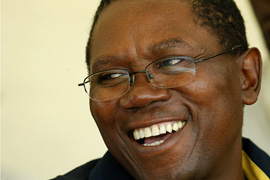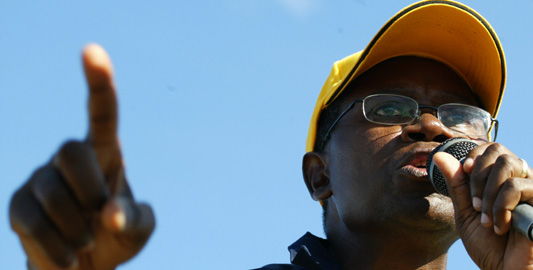Profile: Simba Makoni
Mugabe’s former ally presents himself as candidate of change and economic recovery.

|
|
| Makoni is campaigning on a platform ‘to get Zimbabwe working again’, and hoping to capitalise on Mugabe’s mismanagement of the economy [AFP] |
Simbarashe Makoni‘s entry into Zimbabwe’s presidential race as an independent candidate has raised the level of energy in the electoral process.
Makoni, 58, who is challenging Robert Mugabe, Zimbabwe’s octogenarian president and candidate of the governing Zanu-PF party, believes he can harness the key political skills needed for a representative and efficient government.
Makoni also faces competition from Morgan Tsvangirai, 55, of the Movement for Democratic Change.
As Mugabe’s long-standing political rival, Tsvangirai has twice opposed him in presidential votes.
‘Candidate of change’
Days after announcing his nomination, Makoni launched his manifesto, premised on the resuscitation of Zimbabwe‘s battered economy and correcting the flaws of the land-reform programme.
Makoni says he represents change for Zimbabwe.
“I share the agony and anguish of all citizens over the extreme hardships that we have all endured for nearly 10 years now, in this sad nation which is full of fear, a nation in deep stress,” he says.
Makoni is running on a platform of “economic revival, re-engagement, reconciliation and national unity”. He is using yellow as his campaign colour to signify the dawn of what he deems a new era, the emblem of his party being the rising sun.
The state-run Herald newspaper has denounced Makoni as a pawn of Britain, saying that his candidacy is being used in hopes of splitting the Zanu-PF vote so that Tsvangirai can win the election.
But in an ad released on Zimbabwe TV, Makoni says: “I am genuine, I am honest, I am real, and I am Simba Makoni. … Zimbabwe, I humbly place myself at your service and I also place myself in your hands.”
Cabinet veteran
Simbarashe Herbert Stanley Makoni was the youngest member of Mugbabe’s first cabinet when he was appointed deputy minister of agriculture after Zimbabwe declared independence in 1980.
A year later he was elevated to the position of minister of industry and energy development, which he served until 1983.
 |
| Makoni was a Mugabe ally since 1980 until his recent defection from the Zanu-PF [AFP] |
At the end of his term, member states of the Southern African Development Community elected him to be the body’s secretary-general.
He served in this capacity for 10 years, presiding over the early development of region’s trade and investment policies.
From SADC, Simba was appointed managing director of Zimbabwe newspapers, a printing and publishing group of six operating companies which he left in 1997 to pursue private business interests.
He returned to public service in 2000 as minister of finance and economic development.
Zimbabwe was already experiencing serious economic problems and rising social and political tensions. Relations with the international community were strained.
Simba’s mandate was to steer economic transformation and maintain good relations with the international development community that included leaders of multilateral and bilateral organisations.
Economic woes
Eight years on, Makoni, now a rival of Mugabe, has no hesitation in stating that Zimbabweans are experiencing stress and tension because of poverty that affects over 80% of the population.
Zimbabwe, once among the most prosperous countries in Africa, now has inflation running at 100,000 per cent.
A loaf of bread costs millions of Zimbabwean dollars, one of the many reasons why elections present the first serious challenge to Mugabe’s presidency since he took power 28 years ago.
Makoni says rampant unemployment, dispersion and disintegration of the national fabric have turned his countrymen into economic refugees.
He says Zimbabwe has experienced a massive decline in the condition and quality of education, health, housing, energy, water, sanitation and other services.
 |
| Makoni has eschewed talk of a quick fix, saying that the country must come together [AFP] |
Once elected, Makoni vows to undertake immediate measures to address these challenges and also to develop a policy framework for economic and social renewal – in the short, medium and long term.
Makoni is fortunate to have escaped accusations of corruption that have bedevilled most of Mugabe’s inner circle.
He has also refused to become involved in the political blame game, training his sights instead on Mugabe’s handling of the economy, in a country where even basic commodities such as bread and cooking oil are in short supply.
Nevertheless, Makoni has eschewed talk of a quick fix, saying only that the country must come together.
“I single-handedly will not be able and will not even think of trying to turn around the economy around by myself,” he says.
Tsvangirai has described Makoni as “old wine in a new bottle” because of his long association with Mugabe and Zanu-PF.
But there is no denying that Makoni’s dramatic last-minute defection is an indication of dissent within Mugabe’s inner circle.
